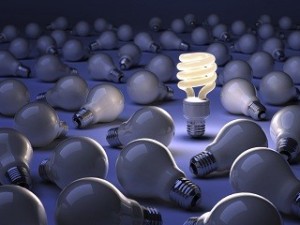From Guest Blogger Emma Joyce: Sustainable Home Lighting Guide to Reduce Power Consumption

Use eco-bulbs
There are two main types of light bulbs which are thought of as eco-friendly: CSLs and LEDs. Compact fluorescent bulbs are the way to go for everyday lighting around the house. Many people are reluctant to buy them, because they are quite a bit more expensive than regular bulbs, but because of how much less energy they consume and their lifespan, they pay themselves off after the first 500 hours – and they can last up to 10,000 hours. But it is not just about how much they use: because they are so efficient, they don’t release nearly as much heat, meaning that you don’t need to use extra energy in the summer to cool down your home.
LEDs, or light-emitting diodes, are the other option. The biggest problem with them for the past years have been the prices: they were even more expensive than CSLs, but fortunately, the costs have been slowly decreasing. LEDs are said to be able to use 80-90% less energy than regular bulbs and can last for a whopping 100,000 hours. They also light up faster than other bulbs. Simply changing your bulbs is a great way to reduce energy consumption and prolong the life of your light bulbs, saving you money as well as saving energy resources.
Plan with sunlight
We all share the biggest light bulb we have – the sun. Just think back to how our ancestors lived without electricity for a very long time, and using the most out of sunlight was the key for that. If we simply practice not turning on the lights whenever we can get natural sunlight, we would be heading well in the right direction. If you think that leaving the blinds up during summer will heat up your rooms too much, there are actually windows made especially to prevent that from happening, so you can have all the sun and no heat. Building a home, or adding new space, is a tough job but you should also consider sunlight in your new space. With new trends, like granny flats in Australia, people opt for bigger windows and more light in their rooms. Just be included in your house plan to be sure you will have enough light in your home.
Teach and practice good habits
The best and easiest thing we can do to conserve power is to have good habits. The very basics being: turn off the light when you leave the room. So many of us leave the lights on and waste so much without even realizing it. Another way we can conserve power is to learn how to shop for appropriate lighting. Some lights actually drain power even when they are turned off, and learning how to spot the correct ones is an important thing. The third important habit is regularly checking all of the electrics in the home.
To sum up: there really is a lot we can do to reduce power usage through our lighting and none of it requires a lot of work nor money. In fact, being aware of how much we spend can only benefit our financial state. Good habits and awareness of how much we are spending can contribute to reducing energy use. There are no downsides to spending less energy, so we should do all we can. Teaching younger generations those good habits and rules will be the way we change our habits as a society and keep our world’s resources safe.
